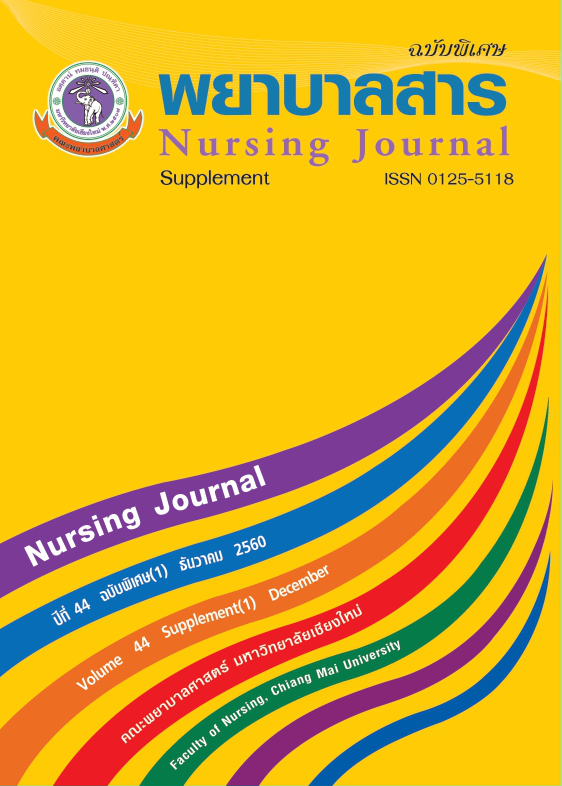Factors Predicting Paternal Depression in Postnatal Period
Keywords:
Factors predicting, paternal depression, postnatal periodAbstract
Paternal depression during the postnatal period is an important emotional change that has a negative effect on the physiology, psychology, role of fathers, families and society. The purpose of this predictive correlational research study was to determine correlations between and the predictability of age, educational level, paternal status, self-esteem, marital relationship and paternal depression during the postnatal period. Data were collected through three self-reports, involing 84 fathers of children aged 6 and 8 weeks old at Health Promotion Hospital Health Promotion Center Region 1 Chiang Mai and Maharaj Nakorn Chiang Mai Hospital during March to June, 2015. The research instruments used were the Edinburgh Postnatal Depression Scale (EPDS), the Rosenberg*Self-esteem*Scale (RSE) and the Marital Relationship Questionnaire. Data were analyzed using descriptive statistics, Eta correlation, Pearson product-moment correlation coefficient and multiple regression analysis.
Results of the study revealed that:
Paternal depression during the postnatal period was documented at 21.40% with
a mean score of 5.92 (S.D. = 3.76). There was a statistically significant low positive correlation between paternal status and paternal depression (Eta. = .22, p = .05), a moderate negative correlation between self-esteem and paternal depression (r = -.47, p < .01), and a high negative correlation between marital relationship and paternal depression during the postnatal period (r = -.50, p < .01) Age, educational level, paternal status, self-esteem, and marital relationship accounted for 32.80 % of the variability in paternal depression (p < .05).
The results of this study can be used as guidelines for further study about predicting factors of postnatal depression among Thai fathers and used as data to plan nursing interventions to reduce risk factors of paternal depression during the postnatal period.
References
มหาบัณฑิต สาขาการผดุงครรภ์). บัณฑิตวิทยาลัย, มหาวิทยาลัยเชียงใหม่.
พรรณพิไล ศรีอาภรณ์, นุชนาต สุนทรลิ้มศิริ, กนกพร จันทราทิตย์, จิราภรณ์ นันท์ชัย และพฤกษลดา เขียวคำ. (2558). ปัจจัยที่เกี่ยวข้องกับภาวะซึมเศร้าหลังคลอดของมารดาและบิดาที่มีบุตรคนแรก. เชียงใหม่: คณะพยาบาลศาสตร์ มหาวิทยาลัยเชียงใหม่.
ศรีเรือน แก้วกังวาล. (2553). จิตวิทยาพัฒนาการชีวิตทุกช่วงวัย วัยรุ่น-วัยผู้สูงอายุ เล่ม 2 (พิมพ์ครั้งที่ 9).กรุงเทพฯ: สำนักพิมพ์มหาวิทยาลัยธรรมศาสตร์.
สุพัตรา สุภาพ. (2545). สังคมวิทยา (พิมพ์ครั้งที่ 6). กรุงเทพฯ: ไทยวัฒนาพาณิชย์.
อุสา สุทธิสาคร. (2552). วัฏจักรชีวิตครอบครัว. กรุงเทพฯ: มูลนิธิเครือข่ายครอบครัว.
American Psychiatric Association. (2000). Diagnostic and statistical manual of mental disorders
(4thed.). Washington, DC: American Psychiatric Press.
Barclay, L., & Lupton, D. (1999). The experiences of new fatherhood: A socio‐cultural analysis. Journal of Advanced Nursing, 29(4), 1013-1020. doi: 10.1046/j.1365-2648.1999.00978.x
Bartlett, E. E. (2004). The effects of fatherhood on the health of men. The Journal of Mens’ Health & Gender, 1, 159-169. Retrieved from http://www.sciencedirect.com/science/article/pii/S157189130400069X
Bergström, M. (2013). Depressive symptoms in new first‐time fathers: Associations with age, sociodemographic characteristics, and antenatal psychological well‐being. Birth, 40(1),
32-38.doi: 10.1111/birt.12026
Chung, T. K. H., Yip, A. S. K., Lok, I. H., & Lee, D. T. S. (2011). Postnatal depression among Hong Kong Chinese fathers. Hong Kong Medical Journal, 17(1), 9-12.
Cox, J. L., Holden, J. M., & Sagovsky, R. (1987). Detection of postnatal depression development of the 10-item Edinburgh Postnatal Depression Scale. The British Journal of Psychiatry, 150, 782-786. doi: 10.1192/bjp.150.6.782
Dudley, M., Roy, K., Kelk, N., & Bernard, D. (2001). Psychological correlates of depression in fathers and mothers in the first postnatal year. Journal of Reproductive and Infant Psychology, 19(3), 187-202. doi:10.1080/02646830124397
Edoka, I. P., Petrou, S., & Ramchandani, P. D. (2011). Healthcare costs of paternal depression in the postnatal period. Journal of Affective Disorders, 133, 356-360. doi:10.1016/j.jad.2011.04.005
Goldberg, W. A. (2014). Father time: The social clock and the timing of fatherhood. Basingstoke: Palgrave Macmillan.
Kim, P., & Swain, J. (2007). Sad dads: Paternal postpartum depression. Psychiatry, 4(2), 35-47. Retrieved from http://www.ncbi.nlm.nih.gov/pmc/articles/PMC2922346/
Koh, Y. W., Chui, C. Y., Tang, C. S. K., & Lee, A. M. (2014). The prevalence and risk factors of paternal depression from the antenatal to the postpartum period and the relationships between antenatal and postpartum depression among fathers in Hong Kong. Depression Research and Treatment. doi: http://dx.doi.org/10.1155/2014/127632
Matthey, S., Kavanagh, D. J., Howie, P., Barnett, B., & Charles, M. (2004). Prevention of postnatal distress or depression: An evaluation of an intervention at preparation for parenthood classes. Journal of Affective Disorders, 79, 113– 126.
Melrose, S. (2010). Paternal postpartum depression: How can nurses begin to help?. Contemporary Nurse, 34(2), 199-210. doi:10.5172/conu.2010.34.2.199
Paulson, J. F., Dauber, S. E., & Leiferman, J. A. (2010). Parental depression, relationship quality, and nonresident father involvement with their infants. Journal of Family Issues, 32(4),
528-549. doi: 10.1177/0192513X10388733
Pitanupong, J., Liabsuetrakul, T., & Vittayanont, A. (2007). Validation of the Thai Edinbergh Postnatal Depression Scale for screening postpartum depression. Psychiatry Research, 149, 253-259. doi:10.1016/j.psychres.2005.12.011
Polit, D. F. (2010). Statistics and data analysis for nursing research (2nded). New Jersey: Pearson Education Inc.
Pollock, M. A., Amankwaa, L. C., & Amankwaa, A. A. (2005). First-time fathers and stressors in the postpsrtum period. The Journal of Perinatal Education, 14(2), 19-25.
doi: 10.1624/105812405X44682
Post and Antenatal Depression Association (PANDA). (2013). Men and postpartum depression. Retrieved from http://www.panda.org.au
Ramchandani, P. G., Stein, A., Evans, J., O’Connor, T. G., & ALSPAC Study Team. (2005). Paternal depression in the postnatal period and child development: A prospective population study. Lancet, 365, 2201–2205. Retrieved from www.thelancet.com
Roajutitham, P. (2006). Marital relationship, attitude toward sex role, and paternal involvement in child-rearing of 6 – 12 month first – born infant. (Unpublished master’s thesis). Mahidol University, Bangkok, Thailand.
Rosenberg, M. (1965). Society and the adolescent self-image. Princeton: Princeton University Press.
Sansiriphun, N. (2009). Becoming a first time father among Thais. (Unpublished doctoral dissertation). Chiang Mai University, Thailand.
Spanier, G. B. (1976). Measuring dyadic adjustment: New scales for assessing the quality of marriage and similar dyads. Journal of Marriage and the Family, 38, 15-28. Retrieved from http://www.jstor.org/stable/350547
Srisaeng, P. (2003). Self-esteem, stressful life events, social support, and postpartum depression in adolescent mothers in Thailand (Doctoral dissertation, Case Western Reserve University) Retrieve from http://search.proquest.com/dissrtations/docview
/305270514/4450973C61D5485DPQ/1?accountid=44722
Wang, S. Y., & Chen, C. H. (2006). Psychosocial health of Taiwan postnatal husbands and wives. Journal of Psychosomatic Research, 60, 303-307. doi:10.1016/j.jpsychores.2005.08.012
Downloads
Published
How to Cite
Issue
Section
License
บทความที่ได้รับการตีพิมพ์เป็นลิขสิทธิ์ของวารสารพยาบาลสาร
ข้อความที่ปรากฏในบทความแต่ละเรื่องในวารสารวิชาการเล่มนี้เป็นความคิดเห็นส่วนตัวของผู้เขียนแต่ละท่านไม่เกี่ยวข้องกับมหาวิทยาลัยเชียงใหม่ และคณาจารย์ท่านอื่นๆในมหาวิทยาลัยฯ แต่อย่างใด ความรับผิดชอบองค์ประกอบทั้งหมดของบทความแต่ละเรื่องเป็นของผู้เขียนแต่ละท่าน หากมีความผิดพลาดใด ๆ ผู้เขียนแต่ละท่านจะรับผิดชอบบทความของตนเองแต่ผู้เดียว






